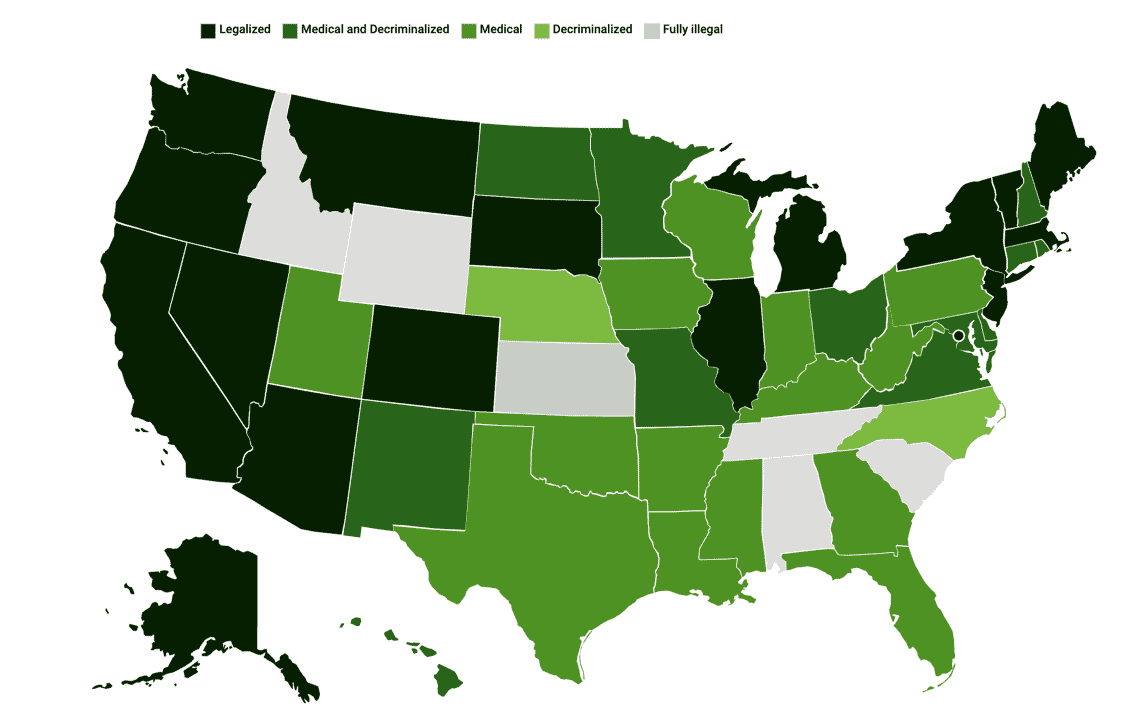Where in the U.S. is Marijuana Legal?
Today, marijuana use is legal in 75% of the states in the U.S. However, the circumstances for each state differ. Some states have legalized recreational use, others have only legalized medical use, and others still consider all use to be illegal.
For instance, on May 24 of 2022, Rhode Island lawmakers legalized recreational marijuana, and North Carolina could be the next to legalize medical marijuana. Since every state is at such a different stage regarding the legalization (or lack thereof) of marijuana, it’s essential to keep the laws for various states in mind.
We will discuss the difference between federal and state law, the difference between legalization and decriminalization, and everything else that people need to know about marijuana legalization in the United States of America.
Federal Law Versus State Law
As a federal country, the states in the U.S. have the power to develop their own laws and decisions. For this reason, there are both federal laws and state laws in the country.
Federal laws are legal rules that apply throughout the U.S. State laws, on the other hand, are legal regulations that are distinct to a single state.
Sometimes, like in the case of marijuana legalization, state laws contradict federal laws. Today, despite many states opening up to legal cannabis use, the Controlled Substances Act of 1970 deems possession and use of marijuana to be illegal under federal law for any purpose.
Naturally, the biggest question people have about marijuana possession and use is: What happens if it’s legal under state law but illegal under federal law? The answer is that federal law triumphs over state laws.
For now, marijuana retail businesses cannot use banks to borrow money because they are federally regulated entities. Cannabis businesses also cannot deduct their operational expenses from their federal income taxes.
However, if companies manage to keep their business in-state, they may be legal. They can grow, sell, and use cannabis as approved by state laws.
Legalization Versus Decriminalization
Contrary to popular belief, merijuana legalization and decriminalization are not the same. Understanding the laws of your resident state and those you visit can help you avoid unnecessary jail time or fines. Let’s discuss the differences between legalization and decriminalization and how each can impact consumers.
Recreational Mariuana Legalization
Colorado and Washington made headlines in November 2012 when they became the first U.S. states to legalize the recreational use of cannabis. In both states, laws allow marijuana use for adults 21 years old and above.
In January 2014, Colorado legalized retail marijuana shops, and Washington did the same a few months later. Since then, many states have followed suit.
When you’re in a state where recreational marijuana is legal, law enforcement officers cannot arrest, ticket, or convict you, as long as you observe the legal limits for age, place, and amount of consumption. However, as with any illegal business, they can arrest you for selling marijuana if you aren’t a licensed retailer. For instance, in Colorado, there’s still a cannabis black market despite its use being legal.
Medical Marijuana Legalization
Due to legal constraints, there have been very limited studies regarding the use of cannabis for medicinal purposes. However, some research and countless anecdotes have supported its effectiveness against pain, eating disorders, and muscle conditions.
In 1996, California started a movement legalizing medical marijuana, and many states have since followed its example. In most cases, state laws determine legal consumption amounts. For instance, Massachusetts has a 60-day supply limit that can vary per patient.
Most states that allow the use of medical marijuana also grant agricultural exceptions for growing the plant. These efforts are crucial for farmers to supply stores with the necessary stock.
Marijuana Decriminalization
To reiterate, marijuana decriminalization is not the same as legalization. Instead, states that have decriminalized cannabis use have amended their laws to make some acts criminal but no longer subject to prosecution.
For instance, people caught with personal consumption amounts won’t be jailed or prosecuted and won’t receive a criminal record. Instead, in states that have decriminalized marijuana use, law enforcement treats these acts as they would minor traffic violations.
Many states have decriminalized marijuana use. However, possessing commercial quantities or selling marijuana can still lead to more severe punishments. For this reason, it’s essential to identify the legality of marijuana use in states that you move to or travel through.

